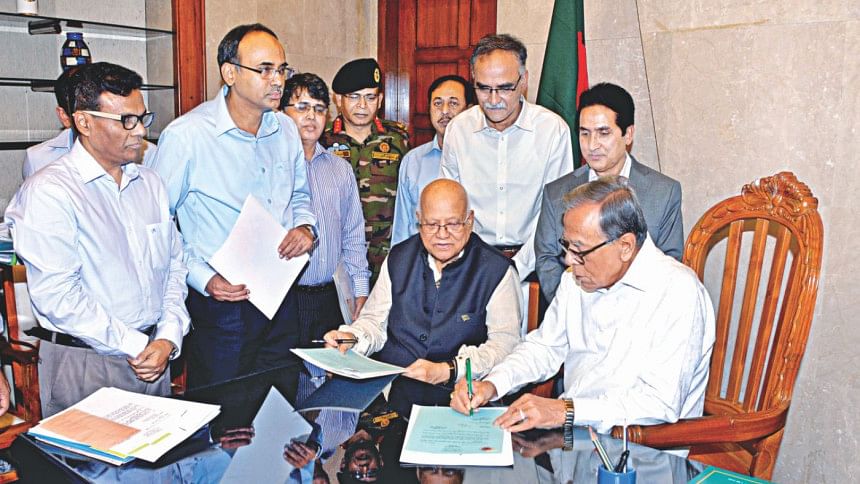Lofty goals, fragile base

It looks like another repeat story.
We had a big budget that failed to achieve its targets. Now we are pushing for a bigger one with higher targets. But with the ground reality remaining the same, are we to see a story foretold for the next year?
This is one way of looking at Finance Minister AMA Muhith's proposed budget for the 2018-19 fiscal year.
Many would agree that an 18.3 percent increase of the proposed budget is neither huge nor ambitious. But then if one considers that we are having one of the lowest annual development programme implementation this year, or that this year's tax revenue collection has really fallen flat, the new targets may look rosy but inherently unrealistic and ambitious.

The budget story now increasingly resembles what Harvard economist Lant Pritchett had called "isomorphic mimicry" -- a term coined from the natural world where animals and plants assume a look that actually defies their reality.
In natural world, a harmless butterfly may look like a ferocious animal to gain an evolutionary advantage. And when this is applied in economics and development theories, it represents a "technique of successful failure". Figures and facts are presented in a way that falsely gives a glowing picture, belying the reality.
The budget story also exposes the constant "capability trap" or the "big stuck" that the country's economy is mired in. Our poor implementation capability is being exposed by the day, starkly and absolutely, as the figures show.
This year's ADP implementation so far is a meagre 52.42 percent, meaning we have to finish up the rest 48 percent job in the next three weeks, an impossible task. Our tax-GDP ratio has barely crossed 7 percent when the original target was 13 percent. Revenue growth is only 17 percent when we need a 30 percent plus acceleration to accomplish the job at hand, another distant dream.
Yet, the finance minister in his budget speech has claimed the government's "enviable capacity" for rapid implementation of socio-economic development plans.
Only a week ago, though, Muhith had lamented poor implementation capacity, saying, "It is indeed a very bad signal. For example, I have been trying to form a pool of project directors for the last two years. But until now, even a list of project directors has not been prepared. This is totally a bureaucratic failure."
So the big question is: Can this failed bureaucracy push up next year's revenue-GDP ratio to 13.4 percent this time, as the minister promises?
And if the target goes haywire, deficit financing would increase, either from the banking system or from the sale of national savings certificates. Both of them will have downsides either in the form of inflation or higher debt servicing. In the end, interest rates will go up and industries and the private sector as a whole will suffer.

But it is the growth of the industrial sector that Muhith has felt the need for so strongly in the budget. He has admitted that industry's contribution to the GDP is at a slower pace and is not generating employment. He has felt that small and medium enterprises should step forward to seal the gap.
From that realisation he has tried to support the local industries through either duty cuts or protection; however, these may be contested from the protectionist point of view which may point out that protection breeds incompetency.
The isomorphic mimicry is further exposed in his rosy depiction of healthcare or education or of the banking sector when he says "the situation is under control for the timely steps". He has garnished a lot of statistics that hide the facts that banks are down under, reeling from non-performing loans and are cash strapped, the health services are nothing but in a dilapidated condition and education lacks quality although Muhith mentions how many schools have been built and teachers recruited.
In his own words, however, there is an acute shortage of skilled manpower, especially in the middle and high level management, exposing that education is lacking quality.
The minister also seems to have lost steam to take on corruption as well as poor reform and governance.
In his FY10-11 budget speech, he had identified corruption as "one of the major impediments to development" and committed to have an independent Anti-Corruption Commission. This year, he is almost mum on what the ACC has been doing.
But the ACC's real state is clear from the case of BASIC Bank. Some Tk 4,500 crore has been embezzled from the public bank by well-connected people, and the ACC has only been tinkering on the fringes.

In 2010, Muhith also spoke of a "modern, efficient, corruption-free and service-oriented" public administration. Five years down the lane in 2016, he admitted that the AL government could not bring necessary reforms in the public administration.
This year, he made no mention of reforming the civil bureaucracy.
The finance minister had also rightly pinned devolution of power through local governments as the key to good governance two years back in his budget speech.
"It would be difficult to infuse dynamism in development initiatives to achieve 10 percent GDP growth unless an enabling environment is created by devolving power," he had said. This year, he still holds firm to his conviction but devolution is still a far-away thing and Muhith alone cannot get it done.
In spite of all these fissures, Muhith has tried his best to come up with an election budget. He has given the budget a social welfare face, with vastly expanded social safety net programmes and even VAT exemptions that will help the poor in the face of rising inequality.
The Government to Person (G2P) payment system of allowances using ICT platforms will likely make the government's safety net programme transparent and graft-free.
Probably on this count Muhith could truly work with passion and sincerity because that also suits a looming election.

 For all latest news, follow The Daily Star's Google News channel.
For all latest news, follow The Daily Star's Google News channel. 








Comments